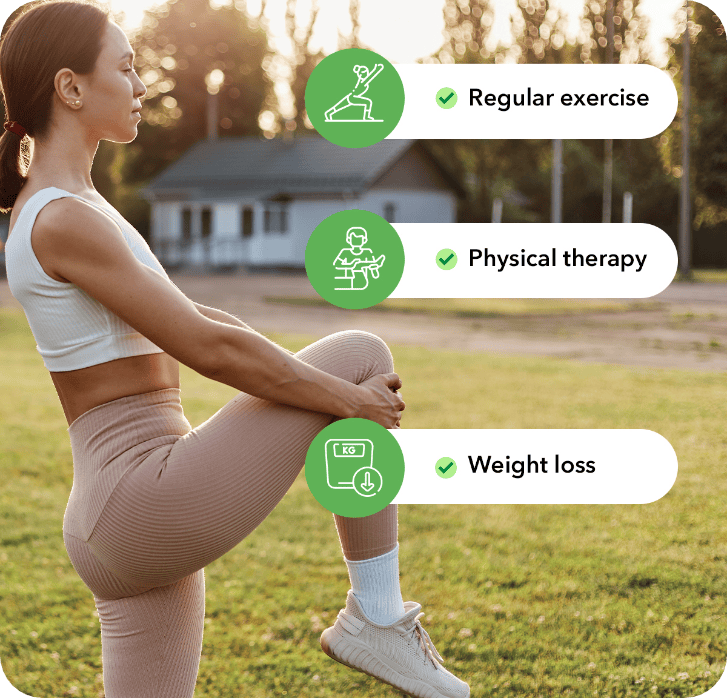Your knees have a big job. They support the body and allow movement like walking, sitting, running, jumping. However, when something goes wrong with this all-important joint, you feel it. One such injury is called locked knee. With this condition, you may just be walking along like usual, just a normal day — normal routine, completely depending on that knee to do its job — and it just stops working.
If your knee is locking up, it means either you can’t bend it, or you can’t straighten it. Either way, it affects your mobility, and it can be both painful and concerning.
Treatment
Here are some steps you can take if you experience knee pain and swelling from a locked knee:
Rest – Don’t aggravate the condition; avoid strenuous physical activity or putting weight on the knee.
Ice – Reducing swelling can help reduce pain. Apply ice to the knee for about 15 to 20 minutes at a time, several times a day.
Elevate – Elevating your leg can help reduce swelling and promote blood circulation.
Therapy – A physical therapist can guide you through gentle stretching and range of motion exercises once the pain and swelling have subsided.
NSAIDs – Use over-the-counter non-steroidal anti-inflammatory drugs to help reduce pain and inflammation in the knee.
A team specializing in business management, finance, sales and marketing is crucial for any franchise organization to run successfully and help the people who need its services the most. Our executive team members bring their rich experience in healthcare and other industries to guide QC Kinetix’s franchise owners.
This team includes people like Scott Hoots, who has played a pivotal role in managing and expanding businesses such as Domino’s Pizza, American Family Care and Pet Wants, a boutique pet food franchise system based in Cincinnati. Another key team member, Jeff Morris, brings over 30 years of financial executive leadership experience at companies of various sizes and complexity and across diverse industries.
Serious Injury?
When your knee is locking up, it can last a few seconds or require immediate medical care, depending on the severity and cause of the injury. It’s best to seek medical evaluation if the condition persists, worsens, or is accompanied by severe pain, instability, or other concerning symptoms. A healthcare professional will utilize imaging tests like X-rays or MRI to provide an accurate diagnosis and appropriate treatment plan. At times, surgery may be required to remove damaged cartilage or bone fragment.

Why Does My Knee Lock Up?
The name says it all. A locked knee literally means something is preventing the joint from proper movement, like bending. There can be a myriad of reasons your knee is locking up. According to the Mayo Clinic, often, it’s caused by a meniscus tear. That’s when a flap, or a small part of the torn meniscus cartilage, may get in the way of the knee joint, inhibiting the ability to bend it. The meniscus, by the way, is cartilage that acts like a cushion between the shinbone and thighbone.
Another cause of locked knee is something called a loose body. This is when something gets caught or in the way — it prohibits the knee joint from fully bending or straightening. According to Healthline, that “something” can be a chip of knee bone that has broken off due to a fall or degeneration of the joint. It might also be a foreign object from a past surgery, decreased blood supply, or other trauma. Sometimes you can actually feel the loose body; it feels like a bump when you touch around your knee.
With locked knee, you’ll likely experience:
- Stiffness
- Pain and swelling
- Feel or hear a popping sound that may come and go.
- Feeling of looseness
- Knee instability
There’s another possible explanation as to why your knee keeps locking up. Pseudo-locked knee is a painful phenomenon that actually involves muscle spasms surrounding the knee that hinder movement of the knee joint. The muscle spasms are prompted by knee pain. With this, you may also feel like something is “catching” on the inside of your knee joint.
How QC Kinetix Can Help
At QC Kinetix, our regenerative medicine knee pain treatments are designed to help you feel better, reduce the pain, improve functionality, and give you the quality of life you desire. If you undergo surgery for locked knee, QC Kinetix treatments can help with your healing. Our treatments use the body’s own healing properties through state-of-the-art natural biologic treatments without the use of addictive pain medications. We can customize a therapy plan based on your pain, medical history, and medication.
If you are suffering from knee or other musculoskeletal discomfort, schedule a free consultation, and we will be happy to discuss the benefits of regenerative therapies with you.

